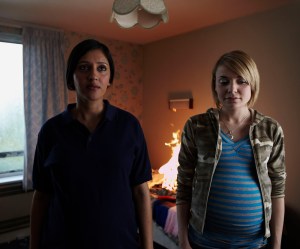Described by Shelagh Delaney as ‘a genius straight from the slums’, Andrea Dunbar is best known for Alan Clarke’s adaptation of her play, ‘Rita, Sue and Bob Too’ (1987) – which has been dismissed in many quarters as a bawdy romp, but is actually a daring piece of social realism with shades of Nouvelle Vague playfulness. Like Delaney, Dunbar was a teenager when she began documenting the social deprivation she saw around her, detailing lives blighted by poverty and despair with unprecedented frankness. But Clio Barnard’s film is not simply a biopic; it also sheds some light on those affected by Dunbar’s life, and in doing so tells a story as dark and compelling as one of her plays.
Barnard opted for a distinctive technique to tell the body of the story, having actors lip-synch the voices of significant figures from Dunbar’s life. This is interspersed with open-air performances of scenes from Dunbar’s plays, with the denizens of the Bradford housing estate where she grew up watching on, and recreations of the events recounted. Dunbar is shown in clips from TV documentaries, a spectre hovering over events, but the film centres on her youngest daughter, Lorraine.
The most startling thing about ‘The Arbor’ is its depiction of Dunbar. This is not a hagiography which sets out to mythologize her life, sanitize her actions and cement her position in the pantheon of literary greats – with a family estate overseeing its passage. Dunbar’s relationship with her children is depicted exactly as it was: distant, neglectful and violent. Her alcoholism is not used as an excuse to mitigate her behaviour; the film explores the worst and best facets of her personality with equal candour, depicting her as both victim and villain. By learning how she impacted those closest to her, we get a picture of who she was and what inspired her work that a sober appraisal of her oeuvre could never achieve.
‘The Arbor’ is a stylistic triumph; its technical elements combining to create an all-pervading mood of sadness, remorse, anger and hopelessness. Ole Bratt Birkeland’s photography is integral to the establishment of the despondent tone which looms over the housing estates where Dunbar’s creative energies were sparked, capturing the brutal utilitarianism of the backdrop; with Harry Escott and Molly Nyman’s ambient score striking a downcast note throughout.
Casting the actors to mouth the words was essential to the film’s success, and those chosen excel in doing so, replicating the cadences of their subjects to the point of total immersion. Majinder Virk is excellent as Lorraine, Dunbar’s mixed race child. In a heartbreaking synthesis of craft and content, Virk articulates the pain of Lorraine’s abandonment and descent into drugs and prostitution with control and conviction. Elsewhere, Natalie Gavin and Jimi Mistry shine in the performance segments, while Christine Bottomley, George Costigan and Neil Dudgeon bring their gift for depicting the everyday to bear on their roles.
‘The Arbor’ has a scope which belies its relatively slender premise, addressing social issues as well as analysing the place of theatre in society. The film posits that the work of writers like Dunbar takes on the status of a dispatch for an upscale audience, providing an insight into places and lives from which they have insulated themselves; the creator indulged like a noble savage by the cognoscenti.
Barnard, a contemporary of Dunbar’s, cleverly merges Dunbar’s thematic concerns into her own, exploring the inarticulate rage that fuels racism and the plight of communities buffeted by the effects of Thatcherism. ‘The Arbor’ not only provides an overview of Dunbar’s life and work but puts it into historical context; the urge to dramatise her life presaging the public confessional that is a central component of the blogosphere.

